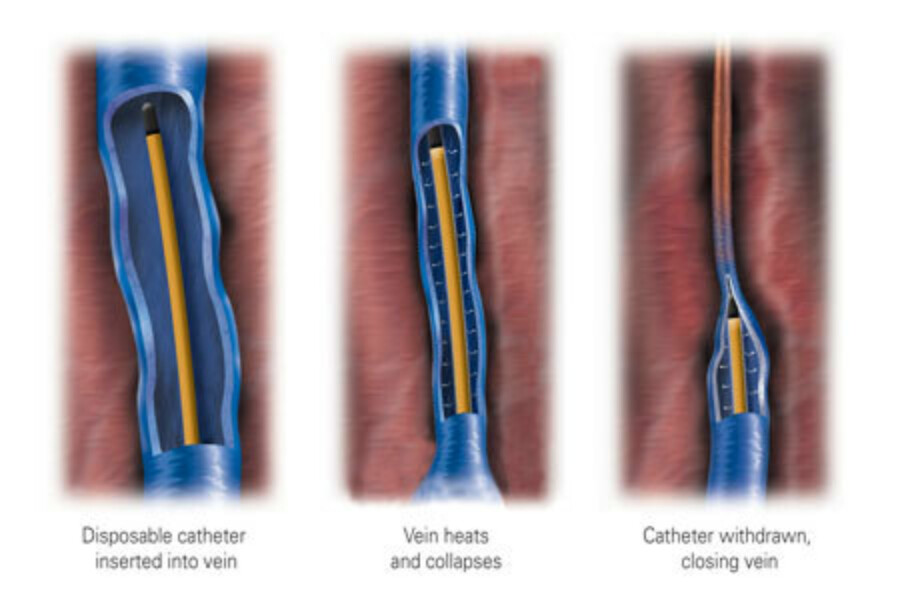
Is Radiofrequency Ablation Painful?
Radiofrequency Ablation is just one modern vein treatment option. In comparison to the out-dated method of vein-stripping, this method is relatively painless and can be done safely in an outpatient environment.

Endovenous Radiofrequency Ablation (RF ablation or RFA) is a safe, effective treatment option for people suffering from the discomfort of varicose veins. RFA uses high frequency alternating current (electric impulse) to generate heat in the affected tissue. This method obliterates the varicose veins in legs resulting in better circulation and relief from symptoms.
Many techniques are being used for treating chronic veins and venous insufficiency in the body. These include vein stripping and ligation, laser ablation, chemical ablation, foam, and glue ablation for major veins. RF ablation has been recognized as one of the most controlled, stable, and reproducible treatment methods.
Speak to your Center for Vein Restoration board-certified physician expert about the treatment option that is best for you. We have over 100 convenient locations nationwide.
We asked Center for Vein Restoration physician Aditya Gupta, MD, RPVI, D-ABVLM, to describe how RFA works. He explains that RF treats the vein using high frequency alternating current with catheters that have bipolar (two sides) electrodes at the tip. The vein wall acts as the conductor, converting the high radiofrequency alternating current (RF) into thermal energy. This energy targets the collagen structure of the vein wall, which results in the obliteration of the vein which closes them down.
Dr. Gupta explains that a thermocouple (a sensor used to measure temperature) in the catheter electrode closely monitors the temperature. It provides constant feedback to the generator to maintain the desired temperature of 120° Celsius (248° Fahrenheit) in the treatment area.
RF heat lesions have smooth and well circumscribed bounding surface
RF lesion can be reproducible as the temperature is monitored from the tip of the treating catheter
Unwanted adverse effects such as boiling, charring, and sticking are avoided by temperature monitoring and the heat being generated in the surrounding tissues and not at the electrode tip.
The procedure involves local anesthesia and perivenous tumescent anesthesia (that is, a technique that provides numbing along the length of veins being treated). The procedure and local anesthesia are usually well tolerated, and patients are not required to be put to sleep. Very anxious patients are prescribed a sleeping pill before the procedure. Except for the numbing part (i.e., the local lidocaine shots along the length of the vein), the rest of the procedure is painless.
Thermal damage to the vein causes thrombosis and fibrosis of the vein. Durable closure of the vein happens over a period, usually taking a couple of months.
After RF ablation, patients may experience some local pain, tenderness, and bruising. These symptoms should subside in seven to ten days. Over-the-counter pain medications help with pain management and patients usually do not require any strong pain medication.
Patients can walk, drive, and resume normal activity immediately after the procedure. They may go back to work the very next day and are advised to refrain from lifting anything heavier than 20 lbs. for four days.
Local tenderness and pain
Bruising
Nerve injury or Paraesthesia (that “pins and needles'' sensation). (Rare)
Deep vein thrombosis (DVT) and Pulmonary embolism (PE). (Rare)
Skin burn. (Very Rare)
Wound infection. (Very Rare)
Dr. Gupta is pleased to report that the short term and midterm success rate as per for RF ablation ranges from 90% to 100%. The long-term results for success are also promising with a success rate of about 87% to 94.9%.
The experts at Center for Vein Restoration use the latest diagnostic tools and treatment techniques to treat leg veins, providing pain relief and restoring comfort. We are experienced in treating many types of venous conditions. We are happy to discuss all therapy options with you and help you choose the right one for you. Schedule a consultation today.
Author: Aditya Gupta, MD, RPVI, DABVLM
Dr. Gupta completed Medical School at Government Medical College and Hospital at Pundab University in Chandigarh, India. He completed an Internal Medicine Residency at Icahn School of Medicine at Mount Sinai (Bronx) and was Fellowship trained in Venous and Lymphatic Medicine through the Center for Vein Restoration Fellowship Program.